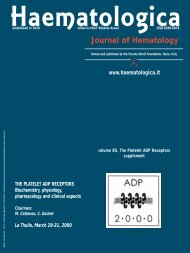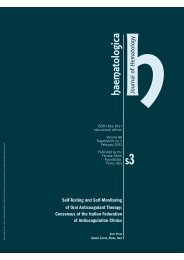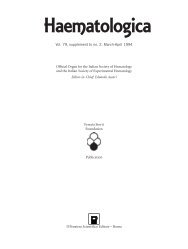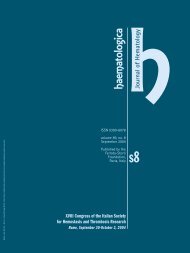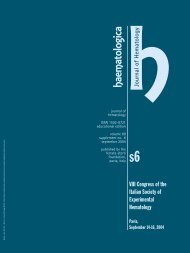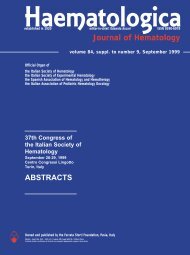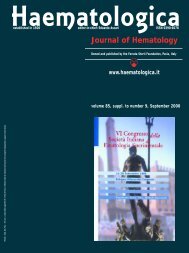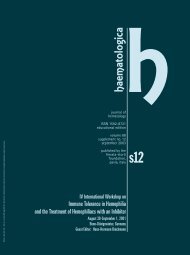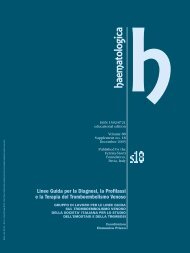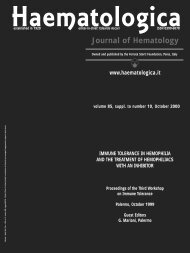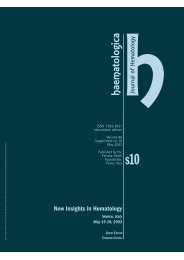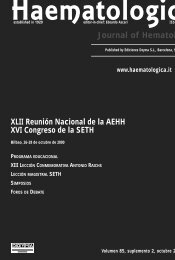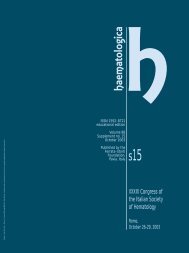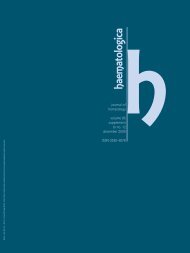Haematologica 2003 - Supplements
Haematologica 2003 - Supplements
Haematologica 2003 - Supplements
Create successful ePaper yourself
Turn your PDF publications into a flip-book with our unique Google optimized e-Paper software.
were not changes in the rate of TNF, VEGF, beta-2-MG,<br />
inmunoglobulins, platelets neither other parameters.<br />
Conclusion: The treatment with high dose of rHuEpo, corrects the<br />
anemia in the patients with myeloma and it also interferes with<br />
the biology from this illness when diminishing, for unknown<br />
mechanisms, the rate of IL-6 and of PCR. The TNF-alpha and<br />
VEGF don't modify after the treatment with rHuEpo.<br />
Project 2PR02A006 financed by the Dirección General de<br />
Enseñanzas Universitarias e Investigación de la Consejeria de<br />
Educación, Ciencia y Tecnologia de la Junta de Extremadura.<br />
255<br />
High dose Erythropoietin in Elderly Multiple<br />
Myeloma(MM) patients with anemia.<br />
G. La Verde,S.Leonetti Crescenzi*<br />
Hosp. S.Andrea, Roma , *Hosp. Umberto I, Frosinone, Italy .<br />
Anemia occurs in almost all patients (pts) during the course of<br />
MM and inadequate levels of erythropoietin can be detected in at<br />
least 50% of them. Recombinant Epo (rh-Epo) therapy became<br />
an useful component in the treatment strategy of MM giving a<br />
respose in 50/60% of patients when administered at conventional<br />
dosage of 10.000 IU s.c. 3 times/weeks.<br />
The aim of the present study was to investigate: 1) the efficacy in<br />
improving Hb level and quality of life and 2) feasibily of early<br />
high dose rh-Epo (40.000 IU, twice a week) during induction<br />
treatment of elderly(>60 yrs) MM patients with Hb level 12g/dl, major (MR) - stable increase of<br />
2 gr/dl -, and minor (mR) - Hb increase >1 < 2 gr/dl -.Patients,<br />
who did not achieve any improvement in Hb and/or maintained<br />
the same transfusion requirement were considered non<br />
responders.<br />
From December 2001 to August 2002, 9 patients (7 females and 2<br />
males, median age 68 yrs, range 60-73 yrs) entered in this study:<br />
4 patients were at diagnosis and 5 in first progression state, 6 had<br />
disease stage IIA, 2 IA and 1 III B at diagnosis. Before rh-Epo<br />
therapy median Hb level was 8 gr/dl (range 6,9-9,5), median<br />
reticulocyte count was 0,8% (range 03-2), median transferrin<br />
saturation index was 43% (range 13-65). Three patients required<br />
supportive therapy: 2,2 and 3 RBC unit/month, respectively. The<br />
median fact-an evaluation was 42,7.<br />
After three weeks of treatment ( 6 high doses rh-Epo), 8/9<br />
patients (88%) were responders (4 MR and 4 a mR),the median<br />
Hb level was 10,1 gr/dl (range 8,4-11,3) and median increase Hb<br />
level was 1,5 gr/dl (range 0,7-3,5). Only 1 pt resulted refractory,<br />
even if in this case supportive therapy requirement reduced from<br />
3 to 1 RBC unit/month. No difference was observed between<br />
patients treated at diagnosis or in progression phase. Only one<br />
patient (at diagnosis) increased significantly Fact-an evaluation (<br />
>30% ) :total median point 43,5.<br />
After the first month of maintenance with conventional doses, all<br />
responder pts maintained the Hb improvement (median Hb level<br />
10,5 gr/dl, range 9,5-12 g/dl) achieved during induction. As to<br />
February <strong>2003</strong>, after a median follow-up of 11,8 months (range 6<br />
–13 months), 6 pts continued to be responders, (3 MR and 3<br />
mR)and 2 relapsed after 4 and 6 months respectively. The only<br />
refractory patient died, because of disease progression, after 7<br />
months of follow-up.<br />
These results show that, in the treatment of elderly MM patients,<br />
early HD rh-Epo seems to be an effective and safe approach in<br />
inducing a rapid and stable increase of Hb level, which can be<br />
successively maintained with conventional rh-Epo doses. These<br />
data, even if promising, need to be confirmed in a larger cohort of<br />
patients, with longer follow-up, to better evaluate the real impact<br />
of this rh-Epo schedule both on disease outcome and quality of<br />
life.<br />
256<br />
Rapid and sustained response of disease-related<br />
anemia in patients with multiple myeloma by high<br />
doses of epoetin alpha: the updated results of an open,<br />
non-comparative, single centre pilot study.<br />
Pasquale Niscola, Laura Scaramucci, *Luigi<br />
Menichelli,Velia Bongarzoni, Roberta Ciafrino, Cinzia De<br />
Gregoris, Marco Morucci,Vincenzo Tini, Marco Montanaro.<br />
Hematology Unit, *Pharmacy Unit, ASL Viterbo (Italy).<br />
The results of a pilot experience on the management of the<br />
multiple myeloma (MM)-related anaemia, evaluating the efficacy<br />
and tolerability of a new regimen of high doses (HD) of<br />
erythropoietin-alpha (epoetin alpha, 40,000 IU), are reported. Ten<br />
patients with a median age of 72 (45-87) years entered the study.<br />
Nine patients were in IIIA and one in IIA disease stage. Median<br />
time from diagnosis was 38 months (range: 1-74 months). Five<br />
patients presented very advanced MM, three a stable response<br />
and two were at the onset of the disease. The median previous<br />
lines of anti-myeloma treatments were 2 (range: 0-5). All<br />
patients received anti-myeloma treatments according to the phase<br />
of disease.<br />
The mean hemoglobin (Hb) and serum erythropoietin levels were<br />
8.5 ± 0.7 g/dl and 43±17 mU/ml respectively. Epoetin alpha<br />
40,000 IU, was given twice weekly (TW), SC, for 4 weeks (8<br />
weeks in non- responders) or shorter period if patients achieved<br />
an Hb level >12 gr/dl. After the induction phase, the dosing<br />
interval was progressively longed. The responders received<br />
epoetin alpha 40,000 U once weekly (OW) for two weeks and<br />
then the same dose was given every two weeks. An I.V. iron<br />
supplementation was given on regular basis (125 mg weekly)<br />
during the induction phase. The responders received the same<br />
dose of I.V. iron if presenting hypochromic erythrocytes >10% of<br />
the total or transferrin saturation 2 gr/dl or by >1<br />
gr/dl respectively.<br />
Overall, 9 (90%) of 10 patients responded to the treatment: 2<br />
achieved a minor response and 7 a major response. Out of these,<br />
2, 3, 2 and 1 achieved the response within the first, the 2nd, the<br />
3rd and the 4th week respectively, reaching a mean (±SD) Hb<br />
level of 12.6±1.5 gr/dl; one patient showed a late response,<br />
becoming transfusion independent after 7 weeks. Out of the 9<br />
responders, 8 stopped the treatment: 6, presenting a stably<br />
maintained erythroid response, died after 18, 24, 26,42, 46 and 58<br />
weeks respectively; the seventh stopped epoetin alpha after 10<br />
weeks and was undergone to an allogeneic peripheral blood stem<br />
cell transplantation; the remaining patient lacked the response to<br />
epoetin alpha after 52 weeks. To date, two patients have a<br />
S201



